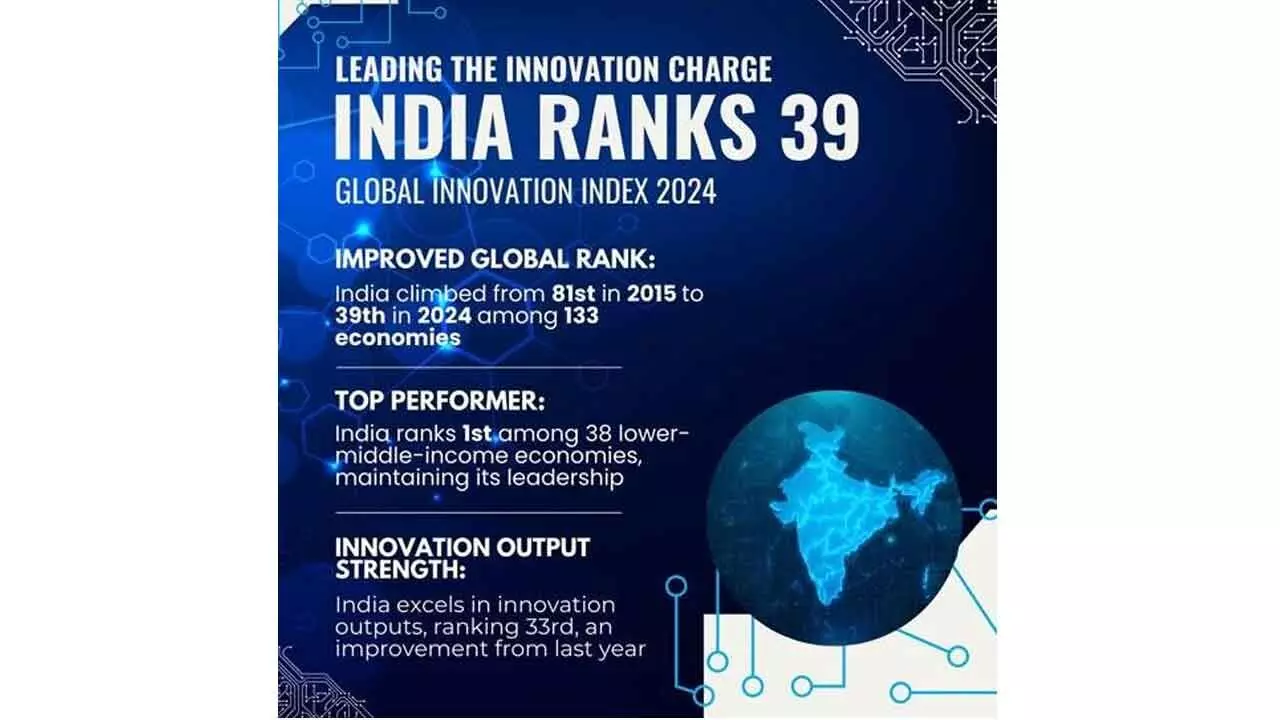India’s leap in Innovation Index

A Testament to the Nation’s Growing Innovation Ecosystem
Through initiatives like Start-Up India, Digital India, and the Atal Innovation Mission, the Indian government has continuously fostered entrepreneurship, research, and technological advancement. These programmes, along with sustained efforts in boosting innovation infrastructure and enhancing collaboration between academia and industry, have been key drivers of this growth - 39th position among 133 global economies
India has achieved a significant milestone in the Global Innovation Index (GII) 2024, securing the 39th position among 133 global economies. This leap in ranking reflects India’s commitment to fostering a robust innovation ecosystem that is underpinned by strong policies, investment in research and development (R&D), and a collaborative environment for startups and industries. The country’s growing innovation potential has been supported by government initiatives that prioritize technological advancement, ease of doing business, and entrepreneurship. This impressive achievement is a clear indication of India’s emergence as a global innovation leader, a feat that also underscores its rapid transformation from a developing economy into a hub of cutting-edge technological and scientific breakthroughs.
A Steady Ascent
In a span of nearly a decade, India has made tremendous strides in the GII rankings, rising from the 81st position in 2015 to 39th in 2024. This steady climb reflects the country’s focused approach towards nurturing innovation across various sectors, driven by strong governmental support and a robust intellectual property framework. Prime Minister Narendra Modi hailed India’s rise to the 39th position in the GII rankings as a “remarkable feat.” He emphasized that this achievement reflects the government’s dedication to building a vibrant innovation ecosystem that can transform opportunities for the nation’s youth.
This achievement highlights India’s growing leadership in innovation, especially as the country ranks 1st among 10 economies in Central and Southern Asia and 1st among lower-middle-income economies. Furthermore, India ranks 4th globally in the World Intellectual Property Organization’s (WIPO) Science & Technology (S&T) Cluster Ranking, with key cities like Mumbai, Delhi, Bengaluru, and Chennai listed among the World’s Top 100 S&T clusters. Additionally, India stands 7th globally in intangible asset intensity and excels in innovation outputs, ranking 33rd, marking a notable improvement from the previous year. This recognition underscores India’s continued dominance and leadership in innovation across multiple sectors.
In the 2024 edition of the GII, Switzerland, Sweden, the United States, Singapore, and the United Kingdom have emerged as the world’s most innovative economies. However, India, along with China, Turkey, Vietnam, and the Philippines, has been recognized as one of the fastest-rising economies in terms of innovation over the past decade.
What is GII?
The Global Innovation Index (GII) was launched in 2007 through a collaboration between INSEAD, a prominent business school, and World Business, a British magazine. It offers a comprehensive evaluation of global innovation by tracking the performance of 133 economies worldwide. The Global Innovation Index serves as a benchmark resource that charts global innovation trends, guiding policymakers, business leaders, and others in unleashing human ingenuity to improve lives and address shared challenges, including climate change.
Key Initiatives
India’s rise in the Global Innovation Index (GII) reflects not only the country’s remarkable progress but also its growing potential to emerge as a global hub for innovation. Through initiatives like Start-Up India, Digital India, and the Atal Innovation Mission, the Indian government has continuously fostered entrepreneurship, research, and technological advancement. Startup India was launched on January 16, 2016, with the goal of nurturing entrepreneurship, building a strong startup ecosystem, and transforming India into a nation of job creators rather than job seekers. This initiative includes a variety of programs designed to support emerging entrepreneurs. These efforts are coordinated by the Startup India Team, which reports to the Department for Promotion of Industry and Internal Trade (DPIIT). As of September 30, 2024, DPIIT has officially recognized 1,49,414 entities as startups.
Digital India is a key government initiative aimed at transforming India into a digitally empowered society and knowledge-based economy. The Digital India programme is centred on three key vision areas: digital infrastructure as a core utility to every citizen, governance & services on demand, digital empowerment of citizens.
Ecosystem Boost
Atal Innovation Mission (AIM), established in 2016, is a flagship initiative of the Government of India to promote a culture of innovation and entrepreneurship across the country. AIM adopts a comprehensive approach to foster problem-solving and innovative thinking in schools, while also creating an entrepreneurial ecosystem in universities, research institutions, and the private and MSME sectors. Till date, AIM has established 10,000 Atal Tinkering Labs in Schools across the country, more than 3500 startups are incubated at Atal Incubation Centres and have created more than 32000 jobs in the ecosystem.
These programmes, along with sustained efforts in boosting innovation infrastructure and enhancing collaboration between academia and industry, have been key drivers of this growth. As India continues its upward trajectory in innovation, the focus remains on scaling up infrastructure, promoting intellectual property rights protection, and encouraging public-private collaboration. These actions will solidify India’s competitiveness in the global innovation landscape, fuelling both economic growth and societal advancement.
Conclusion
India’s stellar performance in the Global Innovation Index 2024 underscores its strategic focus on leveraging innovation as a key driver for economic growth and global competitiveness. The nation’s ability to rapidly climb the rankings reflects its concerted efforts to foster a robust ecosystem that encourages technological advancements, research and development, and entrepreneurship.
Looking ahead, India’s sustained focus on innovation will be vital as the country seeks to capitalize on emerging technologies, expand its influence in the global tech industry, and foster inclusive growth. With continued policy support and an evolving talent pool, India is not just poised to maintain its leadership among lower-middle-income economies but also to emerge as a global powerhouse of innovation, driving advancements that could shape the future of industries worldwide. (PIB)














